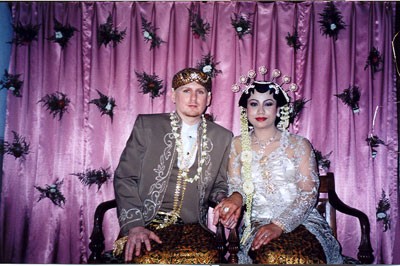Helen Berhane, 27, saw her husband only three times before she married him in April.

- Courtesy of Jibril Hough
- Jibril and Vera Hough knew each other less than three months before they were married
Two of those times, they crammed in quick conversations at Islamic conferences in busy hotel lobbies, places public enough to make their face-to-face meeting an acceptable one in the eyes of Allah. Jibril Hough, spokesman for the Islamic Society of Charlotte and perhaps Charlotte's best-known Muslim, saw his wife just twice before they were married in 1999 -- and the second time, he proposed.
The two Muslim couples got to know each other instead by talking for hours on the phone in the months, or in Hough's case, weeks before they were married. That they talked on the phone at all before marriage puts them in the liberal minority among the Muslim couples Creative Loafing talked to for this article.
Among most devout Muslims, the subject of the phone isn't even up for debate. A couple can talk on the phone only after they are considered by the Muslim community to be married, says Imam Bassam Obeid of the Islamic Center of Charlotte.
"I think knowing each other before you marry is overrated," adds Shamu Shamudeen, a sheik (or Islamic religious scholar) from Ghana who is also with the Islamic Center. But a younger generation of devout Muslims puts a bit more of a premium on it.
Ali, a 21-year-old Jordanian-American electrical engineering student from Charlotte, has been known to send 50 text messages in a day when he's interested in a woman. But he'd never actually call her on the phone, he says. If he were seriously interested in her -- and by that he means seriously interested in marrying her -- he'd call her parents and arrange meetings between his family and hers. They'd eventually decide as a group if it's OK for the two to talk and get to know each other better -- in a chaperoned environment, of course. And that's if she was also interested in him, which she might not be.
When a Muslim man gets rejected, it's usually not just by a woman but by her entire family. That's why it's best to do a little ground work before proceeding. The challenge is to find out as much information as possible about the woman without getting the families involved, Ali says. Hence the text messaging.
"If you are talking to someone, it is not as a disposable relationship but because you have the intention of getting married," says Ali. "You have to have the commitment first before you even enter the relationship."
And even then, you can't be alone together. So goes the sacred and socially complex etiquette of Muslim dating.
But don't call it dating. That makes Muslim leaders cringe. Dating is what Westerners and the non-devout do, and it almost always leads to something sinful. They'd prefer you didn't use the term "arranged marriage," either. Though much of the process is definitely arranged by the couple's parents, according to Islamic law, the woman can refuse a man who pursues her, they say.
Shamudeen says a devout Muslim couple probably wouldn't touch before marriage, even to shake hands. But even Shamudeen calls the arranged marriages that are common in some cultures "way extreme."
"I wouldn't want to be on the receiving end of that," he says, laughing. "That is not Islam."
But the courtship process described above is how it's done in Islam. The people described here aren't radicals. Reference any standard "about Islam" Web site and the marriage process is laid out in black and white. The devout follow it, Muslims CL interviewed from three different local Islamic communities agreed. Those who don't strictly follow the tradition may come from a Muslim heritage, they say, but they are no longer practicing Islam.
"If you are a practicing Muslim -- by practicing I mean you are doing your prayers and you are dressing properly and you are not drinking, all the things you are supposed to do and all the things you are supposed to avoid and that's part of your life -- there's really not a lot of room for interaction at the romantic level for unmarried couples," says D.I. von Briesen, a program chair and database instructor at CPCC.
In a few years, Shamudeen says, when the oldest of his four daughters is looking to marry, he'll supervise the process.
"If I think that this is a possible prospect that is a promising young man, somebody who would be good for my girl, I would let her see him from afar," Shamudeen says. "I'd say, 'Do you have any interest?' The father stands in between as a guardian, a protector for the girl and also the mother. Then they would meet at festive occasions like weddings, but they would not go in private."
Shamudeen says that what the community thinks of a girl is important.